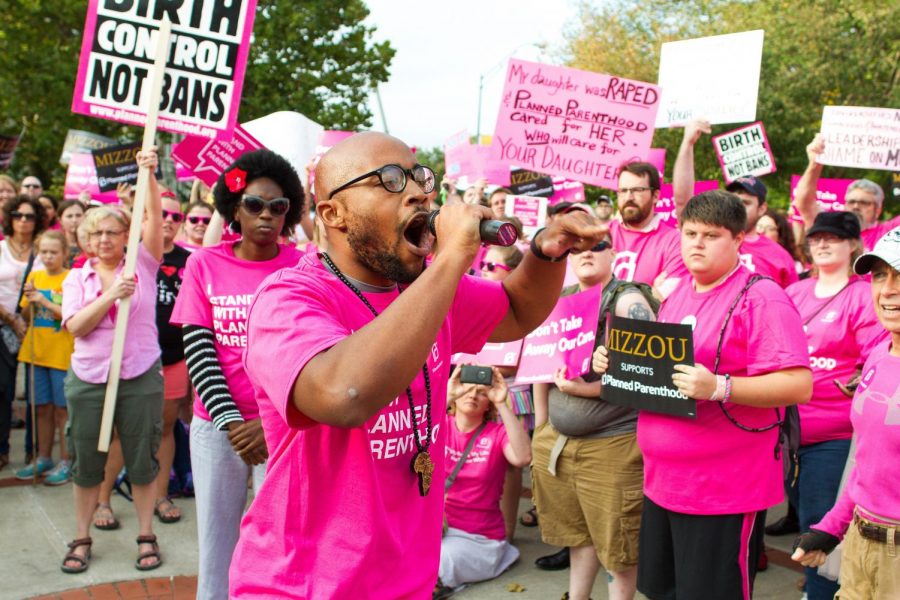Trump Delivers on Restricting Abortion Rights
Pro-choice advocates rally support for Planned Parenthood.
As the presidential campaign heats up, the Trump campaign is making abortion a central component of his platform in hopes of drawing in evangelical and other pro-life voters. On September 3rd, the campaign issued a statement enumerating the steps the Trump administration has made toward pro-life/anti-choice goals and laying out Trump’s plans for his next term, should he be reelected. That list contained a promise to fully defund reproductive health centers that also perform abortions, including Planned Parenthood.
The Trump campaign’s letter called for the “big abortion industry such as Planned Parenthood” to be fully defunded of federal tax dollars. The Hyde Amendment already blocks reproductive health providers like Planned Parenthood from using federal money for abortion services except in cases of rape, incest, or where the life of the mother is in danger. However, even with the Hyde Amendment, reproductive providers are still eligible to obtain federal grant money under Title X, which can be used to provide reproductive health care and birth control to underserved populations. However, the proposed restrictions announced in the September 3rd campaign letter would prevent reproductive health providers from receiving any federal funds—even for the non-abortion services currently eligible for funds under Title X.
This is not the first time the Trump administration has looked to impose restrictions on reproductive health providers who perform abortion services. According to USA Today, in August of 2019, the Trump administration imposed a “gag rule,” which prevented doctors in the Title X program from even counseling patients on abortion options or referring patients to abortion providers. Planned Parenthood and several other reproductive health care providers pulled out of the Title X program as a result of the gag rule and are no longer receiving federal funds. It is expected that the Trump administration will attempt to defund any remaining reproductive health providers who offer abortions through further changes to Title X.
According to Planned Parenthood, in addition to making additional changes to Title X, in its first term, the Trump administration has also appointed hundreds of federal judges who espouse anti-choice views. In the September 3rd letter, the Trump campaign promised to “continue our transformation of the federal judiciary.” Justice Ruth Bader Ginsburg’s recent passing has provided Trump with the unprecedented option to make a third Supreme Court appointment in his first term, reigniting the debate about the availability of abortions in America just weeks before the November 3rd election.
Consistent with the Trump administration’s anti-abortion platform, Trump wasted no time and nominated Judge Amy Coney Barrett to the Supreme Court on September 26th, a week after Justice Ginsburg’s passing. NBC News reports that Barrett, a former law school professor and current judge on the 7th Circuit Court of Appeals, has uniformly opposed abortion rights and does not recognize the Supreme Court’s seminal Roe v. Wade case, which established the right to an abortion, as settled law. As a professor at the University of Notre Dame and a member of the group Faculty for Life, she signed a letter stating she believes in “the value of human life from conception to natural death.” In addition, in her years on the 7th Circuit, she heard two abortion-related cases and in both instances favored further restrictions on abortion rights. Her nomination has pro-choice advocates concerned that Roe v. Wade could be overturned.
If the Trump administration succeeds in further restricting abortion, pro-choice advocates say low-income populations and people of color will be most impacted. For instance, according to Planned Parenthood, around four million low-income people receive care under Title X, and the majority are people of color. Alexis McGill Johnson, CEO of the Planned Parenthood Federation of America states, “The gag rule has particularly harmful impacts on people who have always faced systemic barriers to health care — including those in rural areas, as well as Black, Latino, and Indigenous communities…health care should never come down to how much you earn, where you live, or who you are.” According to data from the Guttmacher Institute, the gag rule reduced the Title X family planning system’s capacity to provide reproductive health services by forty-six percent.
However, anti-abortion advocates contend that the federal government should not fund abortion services, whether directly or indirectly. Like Barrett, many conservatives believe that life begins at conception, and thus view the procedure as immoral. According to MCCL, a Minnesota based pro-life/anti-choice organization, “unborn children” are entitled to the same rights as any other person, and those rights trump a mother’s right to bodily autonomy.
The fate of Planned Parenthood and other reproductive health care centers is largely dependent on two things. Number one is the result of the presidential election. According to BBC News, if Biden wins, he has promised to protect the right to an abortion. If Trump wins, he will almost certainly ramp up his efforts to deny access to abortions and other reproductive health services. The second determining factor is Trump’s Supreme Court pick. If Barrett is confirmed before the election, Roe v. Wade will undoubtedly be in jeopardy. Both pro-choice and pro-life advocates are watching with bated breath, as the next few months will be crucial for abortion rights in America.






